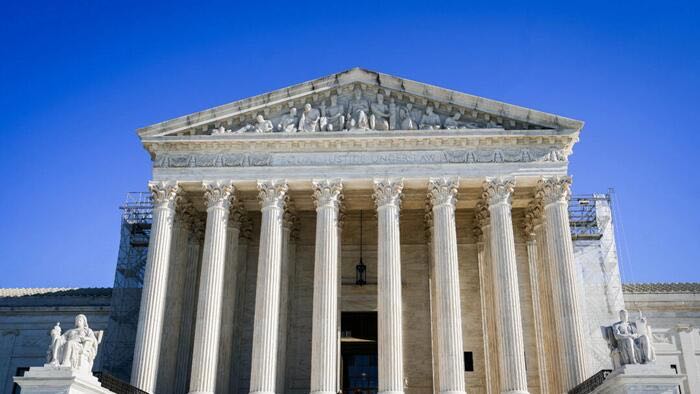FBI Must Face Lawsuit Filed by Muslim Man Put on “No-Fly List”: Supreme Court
Authored by Zachary Stieber via The Epoch Times

The FBI must face a lawsuit filed by a Muslim man who has since been removed from the bureau’s “no-fly list,” the U.S. Supreme Court ruled on March 19.
“The government has failed to demonstrate that this case is moot,” Justice Neil Gorsuch wrote in a unanimous ruling.
“While the government’s representation that it will not relist Mr. Fikre may mean that his past conduct is not enough to warrant relisting, that does not speak to whether the government might relist him if he engages in the same or similar conduct in the future,” he added later.
Yonas Fikre, a Eritrean national and American citizen, sued the FBI in 2015 after having issues traveling due to being on the no-fly list, which is part of the government’s terrorist screening database. It bars certain people from flying.
“The Supreme Court’s unanimous decision is a major blow to the lawlessness that has allowed the FBI to amass almost two million people on their secret lists. This is but the latest indication that the FBI’s secret watchlists have no place in our country,” Gadeir Abbas, an attorney with the Council on American-Islamic Relations who is representing Mr. Fikre, told The Epoch Times in an email.
Government officials did not respond to requests for comment.
Told He Couldn’t Return
Mr. Fikre experienced problems flying, including when he traveled to Sudan in 2009 from Oregon, according to court papers.
While in Sudan at the U.S. embassy there, two FBI agents told Mr. Fikre he could not return to the United States since he was on the no-fly list. The agents also asked him about the mosque he attended and offered to look into having him removed from the list if he became a bureau informant.
Mr. Fikre refused.
Mr. Fikre then went to the United Arab Emirates, where he allegedly was detained for months on direction from the FBI. He eventually ended up in Sweden.
The government in 2015 declined to remove Mr. Fikre from the last, alleging he “is an individual who represents a threat of engaging in or conducting a violent act of terrorism and who is operationally capable of doing so.” The information supporting placing and keeping Mr. Fikre on the last was too sensitive to share, the government said at the time.
Mr. Fikre then filed the suit.
Case Dismissed Before
In 2016, the FBI told Mr. Fikre it removed him from the no-fly list because “he no longer satisfied the criteria for placement on the on-fly list.”
The bureau then asked a federal court to dismiss the case, claiming the removal meant the suit had become moot.
The U.S. District Judge Anna Brown, an appointee of President Bill Clinton, ruled for the government. The U.S. Court of Appeals for the Ninth Circuit reversed the decision because, it said, there was nothing to prevent the government from putting Mr. Fikre back on the list in the future.
After the government swore it would not do that, U.S. District Judge Michael Mosman, appointed under President George W. Bush entered an order dismissing the case.
But the appeals court again overturned the lower court decision, finding that the court wrongly dismissed the claims and that the government had not provided enough information on why Mr. Fikre was placed on and then removed from the list. It remanded the case back to the district court.
The government then appealed the ruling, asking the Supreme Court to step in.
“The court of appeals erred in holding that respondent’s claims challenging his placement on the No Fly List are not moot even though he was removed from that list seven years ago and the government has submitted a sworn declaration stating that he ‘will not be placed on the No Fly List in the future based on the currently available information,’” government lawyers said. “The court’s holding directly conflicts with decisions of the Fourth and Sixth Circuits that have found similar No Fly List claims moot upon the execution of declarations materially identical to the one in this case.”
More on SCOTUS Ruling
The Supreme Court, though, said that the government was wrong.
“The government contends that because Mr. Fikre has been delisted since 2016 and has presumably interacted freely with his co-religionists during that time, it is unlikely he will face relisting in the future. This too is insufficient to warrant dismissal,” Justice Gorsuch, appointed by President Donald Trump, said.
“A defendant’s speculation about a plaintiff’s actions cannot make up for a lack of assurance about its own. The burden here is on the defendant to establish that it cannot reasonably be expected to resume its challenged conduct, and nothing the government offers here satisfies that formidable standard,” he added.
In a concurring opinion, Justice Samuel Alito, appointed by President Bush, said the ruling did not mean the government must disclose classified information to Mr. Fikre, his attorneys, or a court.
Justice Alito was joined by Justice Brett Kavanaugh, who was appointed by President Trump.




